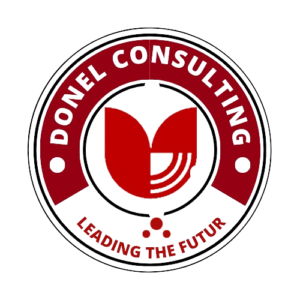Government and Public Sector
Empowering Governments and Public Sector in Africa
Strategic Planning & Public Policy
Donel Consulting helps governments in Africa develop forward-thinking strategies that address the region’s most pressing challenges.
Our services include :
- Future-focused foresight : We analyze global trends and their impact on your region, providing long-term plans for infrastructure, sustainability, and social development.
- Data-driven policy creation: We utilize data analytics to identify citizen needs and craft evidence-based policies for healthcare, education, and social programs, ensuring that policies are tailored to the specific needs of your community.
- Public engagement workshops: We design interactive workshops to gather citizen feedback and build consensus on critical government initiatives, fostering a culture of transparency and inclusivity.
International Relations & Development
Donel Consulting facilitates partnerships and collaborations that drive economic growth and development in Africa.
Foreign direct investment (FDI) attraction
We craft strategies to attract international investment that aligns with government development goals, creating jobs and stimulating local economies.
Multilateral development partnerships:
We facilitate partnerships with international organizations to secure funding and expertise for critical projects, ensuring that development initiatives are sustainable and effective.
Global trade negotiations:
We assist in trade negotiations and agreements that benefit your nation’s economy and citizens, promoting fair trade practices and economic cooperation.
Focus on Public-Private Partnerships (PPPs)
Our services include conducting PPP researches and feasability studies, designing PPP frameworks and financial models and providing training on PPPs.
Get insights from our previous missions
Decentralization, on its own, is just a shift in power. To make it truly effective, it needs two key things :
International development is as much a philosophical endeavor as it is a practical one. At its core, it questions fundamental assumptions about human nature, society, and the world order.
The Urgent Need for Cybersecurity in Critical Infrastructure.
In 2023 alone, the world’s critical infrastructure endured a staggering 420 million cyberattacks, equating to an alarming 13 attacks per second, marking a 30% surge from the previous year
Fair trade practices hold significant promise for creating a more sustainable livelihood for African smallholder farmers, but it’s not a complete solution.
Despite the growth of the fair trade movement, the market for fair trade products remains relatively small, and not all certified producers are able to sell their entire crop under fair trade terms
The Private Sector’s Role in Disaster Risk Reduction in Madagascar
Madagascar, a beautiful island nation, faces a constant threat from natural disasters like cyclones, droughts, and floods. While the public sector plays a vital role in disaster preparedness, response, and recovery, the private sector also has a significant and often untapped potential to contribute to Disaster Risk Reduction (DRR) efforts.
But there are ongoing efforts and investments in modernizing and expanding Africa’s infrastructure to support economic growth and regional integration.
A staggering 70% of Africa’s infrastructure dates back to colonial rule.
From Generation to Generation: Securing a Sustainable Future for Senegalese Fisheries
A Social Safety Net for All : How to extend social protections to informal workers.
A mix of contributory social insurance and tax-financed benefits can help ensure a basic level of coverage for all informal workers, including those with limited capacity to contribute.
African governments spend a lot of money on their employees.
Wage bills as a share of government expenditure range from as low as 7.4% to as high as 56.2% in Africa, indicating substantial variation between countries. On average, public sector wages account for around 70% of government consumption expenditures in developing countries.
Across the vast and diverse landscape of Africa, a singular fiscal challenge unites many nations: the substantial portion of government budgets dedicated to public employee salaries. This phenomenon, while seemingly straightforward, is intricately woven into the fabric of each country’s history, economic development, and bureaucratic structure.
Africa grapples with energy insecurity despite decades of independence.
Despite decades of independence, many African nations continue to grapple with darkness, a challenge with deep roots. Understanding this predicament necessitates a multifaceted lens – one that examines the lingering legacies of colonial infrastructure, the strain of rapid economic growth on nascent energy grids, and the ever-present vulnerability to fluctuating global energy markets.
The impact of historical events like September 11, 2001, on shaping modern terrorism and its repercussions on regions like Mali
Public Service Challenges in Conflict Zones.
Politicization of services : In fragile contexts, the provision or withholding of services become a political tool, used to reward allies or punish opponents.
Balancing External Influences with Domestic Ownership in African Public Sector Development
The trajectory of public sector development in Africa is shaped by a complex interplay between external influences and domestic ownership. While foreign aid, expertise, and best practices can be valuable catalysts for progress, imposing solutions without considering local contexts can prove counterproductive. Striking a balance between these forces is crucial for fostering sustainable and effective …
Why are we training graduates for jobs that don’t exist ?
Industry players are often not involved in curriculum development to advise on the skillsets needed to drive economic growth.
Public service isn’t just about filling potholes and processing paperwork; it’s the engine that powers broader development.
By providing avenues for public participation and redress, they foster a sense of ownership and inclusion, reducing the risk of social unrest and conflict. In fragile and post-conflict contexts, effective public service delivery can be a powerful tool for peacebuilding, helping to address grievances and rebuild the social contract.
Donel Consulting’ frameworks for systemic reforms to address underlying weaknesses in public institutions.
Beyond Feedback: A Nuanced Look at Social Accountability in African Governance.
A key insight from recent experiences is the importance of “interlocution processes” – facilitated dialogues and negotiations between citizens, civil society, and state actors.
Africans should question their role in drafting international laws and principles.
The international legal framework, though meant to be universal, often reflects the priorities and perspectives of dominant powers. Africa’s vibrant cultures, diverse challenges, and rich historical experiences deserve a more prominent place in shaping global rules.
A Multidimensional Approach to Public Sector Performance : the limitations of rankings.
Lack of explicit weightings:
Stakeholders rarely specify exact weights for different performance dimensions, and these likely vary between stakeholders. Without agreed-upon weightings, it’s challenging to aggregate measures into a composite score.
Reimagining Public Service Delivery in a Post-Pandemic Africa
The COVID-19 pandemic exposed vulnerabilities in Africa’s public service systems. Traditional delivery methods, often reliant on in-person interactions and outdated technologies, struggled to adapt. As Africa recovers, a paradigm shift is needed. We must reimagine public service delivery for a post-pandemic world, one that leverages technology, prioritizes citizen engagement, and fosters resilience in the face of future crises.
Senegal plans to introduce its national currency, breaking ties with the CFA franc and Bank of France.
Senegal is poised to take a significant step towards economic independence by introducing its own national currency, severing its long-standing…
African Public Service Reform Stumbles : The Costs of Incoherent Policies and Inconsistent Implementation in African Public Service Reform.
Addressing the specific contexts of individual member states : the potential and limitations of the Charter on Public Service.
The Charter on Public Service, with its lofty ideals of efficiency, transparency, and accountability, holds immense promise for African nations. contexts.
Capacity Building for Microfinance Institutions in Northern Ghana
The complex interplay between leadership, political realities, and long-term public sector reform.
Reformers must recognize and engage with the complex political realities and motivations of key actors. Power dynamics between ministries, objectives of interest groups, election-related motives, and the extent of political leadership for reform should all inform the design and implementation of initiatives
Ethics of Intervention:
In cases of humanitarian crises or state failure, development practitioners often face ethical dilemmas about the extent to which external intervention is justified. This involves balancing the principles of sovereignty, human rights, and responsibility to protect.
Ensuring Nutritional Security: A Look at South Sudan’s Food Fortification Program
South Sudan faces a significant challenge in ensuring nutritional security for its population. The country’s food fortification program is one strategy aimed at addressing this issue.
The African Union faces internal disunity and lack of mutual recognition among African nations within the organization.
The African Union (AU), envisioned as a united front for the continent, faces challenges due to internal disunity and a lack of mutual recognition among member states, what hinders the organization’s ability to effectively address continental issues and achieve its ambitious goals.
The “resource curse” that can trap African nations in a cycle of corruption and conflict.
The paradox where an abundance of natural resources, like oil, diamonds, or minerals, can actually hinder a nation’s development and…
How Disinformation Campaigns Are Pulling Your Strings
Exploiting cognitive biases: They leverage psychological tendencies like confirmation bias and emotional reasoning to make false information more appealing.
How Political Patronage and Clientelism Undermine Public Service Delivery in Africa.
The pervasive use of state resources to provide jobs and services to political supporters, rather than on the basis of merit or need, distorts the allocation of public goods.

